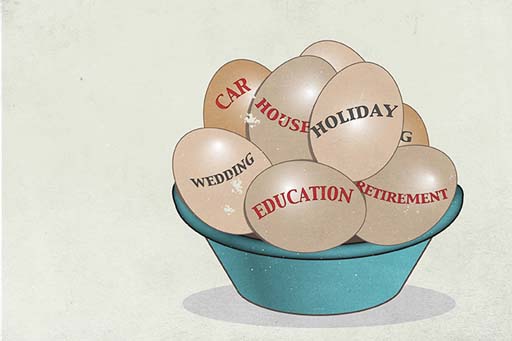1.1.4 Starting your financial plan
Your first step in exploring financial capability is to think in a systematic way about the goals you have in your life. The process is called financial planning. In order to plan effectively you need to take into account the end goal.
This is the first occasion on which we want you to make use of your personal financial plan and fact find [Tip: hold Ctrl and click a link to open it in a new tab. (Hide tip)] (from now on, called simply the ‘fact find’). A fact find is a means of setting out your current financial position and linking it to your goals in life. It’s a summary of your financial health, and can be used when you’re in discussions with advisers about financial decisions that need to be made. Download this now if you haven’t done so already, and when you’ve identified your goals record them in the first two rows, under the heading ‘Assess’.
Try noting down your three most important goals.
Goals are affected by individual circumstances and backgrounds, and by the kind of society in which the person or household is living.
People don’t form goals in a social vacuum. Many goals in life are ‘self-interested’, while others relate to political, ethical or religious commitments. Some people have a goal of helping achieve social fairness; they might be altruistic with their money and give to charity, or they might buy Fairtrade products that don’t exploit individuals or communities. Developments in ethical banking reflect these changes. Similarly, increasing awareness of environmental issues has affected some people’s goals by changing their pattern of consumption, which might lead them, for example, to cut back on unnecessary travel.
It’s very likely that goals will change in the course of a life as events unfold – as people form or leave relationships, have children, experience illness or disability, learn to cope with bereavement, move in and out of different household or family groupings, or live and work in different countries.
Think about goals with financial implications that, say, a young, single adult might have:
- take a holiday abroad next year
- buy a flat within ten years
- help the homeless
- get married in three years’ time
- have a comfortable retirement.
These goals relate to different time periods. In financial terms, ‘short term’ is normally taken to be under five years, ‘medium term’ is around five to ten years, and ‘long term’ is normally more than ten years. Taking a holiday next year and getting married in three years’ time are short-term goals. Buying a flat within ten years is a medium-term goal. Providing for a comfortable retirement is a long-term goal. Helping the homeless is an ongoing goal.

